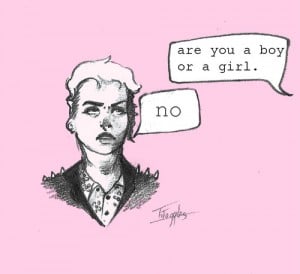“yes bitch, you missed a spot shaving.
yes gurl, you have some 5 o’clock shadow coming in under your foundation.
yes sweetheart, your body shape doesn’t have JLo or Beyoncé curves
AND you are still fucking beautiful.
no questions. no doubts. no ifs/buts/umms about that.”
—Luna Merbruja, “For All My Homegirls Who are Semi/Non-Passable”
The year is 2008, and you are a seventeen-year-old, pre-transition trans girl of color slogging through the endless heteronormative hell that is high school. To most of your classmates, trans women are mythical creatures, “she-males,” the punch line of an infinite reservoir of depressingly unimaginative jokes.
Janet Mock has not yet come out as a trans woman in the pages of Marie Claire, and Laverne Cox is an obscure actress years away from making her big break in Orange Is the New Black. There is no one on TV to be your “possibility model,” to tell you that you that you just might be beautiful.
You are terrified of transitioning, because while you are terrified of a future of staying trapped in the wrong gender presentation, more terrifying still is the prospect of becoming “one of those” trans women:
A trans woman who doesn’t “pass” as a cis woman. A trans woman with a deep voice and hairy skin, or maybe a big belly and large feet. Eight years later, self-appointed trans spokesperson Caitlyn Jenner will say that this kind of trans woman “looks like a man in a dress” and makes people feel uncomfortable.
In this pre-Tumblr Internet era, all of the trans women’s blogs and forums you can find are obsessed with helping you look and sound as much like a cis woman as possible. It is taken for granted that you should want to.
“If you start taking hormones before puberty hits, you’re golden,” the chat forum T-girls say. “After twenty-five, and you can forget about growing breasts beyond a B cup. Save up early for implants and surgery. Foot size is a ‘tell’ – wear shoes that are minimizing. Trans women have man shoulders, so spaghetti straps are a no.”
You are in awe of these women, who post blurry selfies of themselves dressed and made up to the nines. You can barely even tell that some of them are trans. This depresses you, because you don’t believe that you could ever be that beautiful.
It is 2015, and you are twenty-three years old when you finally do start taking hormones. Your doctor tells you it’s lucky that you’re Chinese, because Asian trans women “always have the easiest time passing.” This secretly pleases you, even though by now, you’ve read enough Tumblr to know that this is politically incorrect.
Later that month, your boyfriend asks you innocently if it will feel like he’s “really” with a woman once you grow breasts. You go to the bathroom to cry in private.
Later that summer, you finally say “fuck it” and leave the house in a summer dress without bothering to shave your legs. You don’t bother to scrutinize your face for thirty minutes looking for stray chin hairs. Your dress has a low neckline, which shows off both your Adam’s apple and your total lack of cleavage.
When you get home that night and look in the mirror, you see a beautiful girl for the first time.
This is how you have learned to totally rock your look and love being a non-passing (or only sometimes-passing) trans woman.
1. Accept That You Will Never Pass All the Time
Little by little, you begin to see that the concept of “passing” is a test that has been rigged against you.
If the highest standard of female beauty is based on sexist ideas about cis women’s bodies, then even the most “passable” trans women are forced to live in constant comparison to something they can never become.
There will always be that asshole on the street who shouts “Hey, that’s a dude!” as you walk by, or that family member who just can’t seem to make the shift to using female pronouns. There will always be those awful second-wave feminists who tell you that no matter how many years you spend taking hormones, how much surgery you undergo, how much makeup you wear, you will never, ever “look like a real woman.”
There will always be someone telling you that you are ugly, unnatural, unfeminine, that you don’t pass. Sometimes, you will be that person.
But your body – your beauty – can’t be tested, validated, or disqualified.
Your body is not a failure. You are not a failure.
2. Grieve the Body That You Wanted, But Cannot Have
At some point, you have to give up the fantasy: the consuming, soul-sucking fantasy that if you just work hard enough, if you can just find a way to change your body enough, you’ll be granted entry into the world of cisgender privilege.
This is the fantasy that tells you – not always incorrectly – that with passing comes respect, opportunity, safety, love. This fantasy entraps you, imprisons you, because it keeps you in a constant state of longing to be something, someone else.
The fantasy appears to you in the shape of a body – thin, big-breasted, white-skinned, with slender, elegant limbs, and a vulva instead of your penis and testes. “If you looked like this,” the fantasy whispers, “then people would want you.”
It takes time, space, and tears to release this fantasy. To accept that there is a difference between changing the way you look and the way that people see you. It takes strength to do this. And grief.
3. Meet Non-Passing Trans Women Who Take Your Breath Away
Along the way on your journey through gender, you meet gorgeous, sexy women who know how to look all kinds of fabulous in heels and a beard. Women who are having sex in all kinds of ways that you never even thought about before.
To be honest, there is a part of you that is afraid of women like this, at first.
They make you uncomfortable, because they represent everything that you were so scared of becoming – because they don’t fit inside the incredibly narrow margin of transgender respectability. And what’s more, they don’t even seem to care.
Then you realize that you envy these women. You want to be free and unafraid of your body, your clothes, yourself, like they are.
Then you realize that there is nothing stopping you.
4. Start to Dream of New Ways of Looking More Than Pretty
As you experiment with your gender presentation, you start to conceive of a kind of femininity that goes way beyond the vapid prettiness that you were always taught to want.
You start dream up outfits that don’t minimize or disguise your so-called “masculine” body, but that enhance and celebrate it.
You can wear spaghetti straps on your “man shoulders” if you damn well want to. Better yet, try a dress with shoulder pads that makes them look huge and imperious and intimidating. If you are already taller than the “average” woman, why not heels that make you stand out even higher above the mainstream crowd?
Your femininity doesn’t have to be soft and unthreatening – it can be powerful and challenging, or silly and strange.
It can be a cloak of invisibility, to protect you in public, or a shining femme armor that deflects all insults.
After all, they call it gender expression. Why not express your fullest self?
5. Learn to Love the ‘Ugly’
In her amazing essay on queerness, disability, and magnificent ugliness, activist Mia Mingus writes:
“If we are ever unsure about what femme should be or how to be femme, we must move toward the ugly. Not just the ugly in ourselves, but the people and communities that are ugly, undesirable, unwanted, disposable, hidden, displaced.”
To some people, you realize, you will always be ugly, uncomfortable and shocking to look at, a kind of real-life monster. This is painful, of course, and dangerous. But it can also be a source of strength.
Because your non-passing, ugly trans woman body forces people to confront the reality of their own ignorance, the limitations of their tolerance and the smallness of their worlds.
Your body will not conform to the restrictions that society tries to place on it, and defies expectations – creates room for social change – simply by existing.
What some may call your ugliness is just another name for your revolutionary power.
6. Find Your Fierceness
When you are non-passing or semi-passing, you have no choice but to find your fierceness: the gift and legacy of all trans women.
Fierceness is the ability to walk in the world like every shitty alleyway and downtown street is your runway. It is capacity to ride on every crowded bus full of gawkers and catcallers as though seated on a throne.
Fierceness is the courage it takes to get out of bed in the morning when you know that your sisters are being beaten and killed.
Fierceness glows like a flame in you, even when you are feeling your worst and most defeated: it lights you up and makes you shine.
7. Doubt Yourself
There are days when you fly. When you take the world by storm, impervious to harm in your femme armor.
And there are days when you collapse. When all it takes is a misplaced masculine pronoun, or a hurtful question from your partner, or a shouted insult on the subway to take your armor apart.
There are days when you open your Facebook feed, and right there is an article reporting that yet another trans woman has been killed or committed suicide.
These are the days when you fall.
8. Get Your Groove Back
This is how you pick yourself and put yourself back together: You sleep. Cry. Eat shitty foods, or fancy food, if you can afford it. Watch bad TV on the Internet. Call your trans sister and let her tell you about her new amazing outfit/hairdo/manicure/partner/job/art project until you get jealous and have to hang up the phone. Cry. Write bad poetry and post it on Tumblr. Call your trans sister again. Have a heart to heart. Sleep some more.
Then you open the door and face the world again, for all its danger and all its gifts.
Wear something that makes you feel good about yourself.
9. Rinse and Repeat
For the rest of your life.
[do_widget id=’text-101′]
Kai Cheng Thom is a Contributing Writer for Everyday Feminism. She is a Chinese trans woman writer, poet, and performance artist based in Montreal. She also holds a Master’s degree in clinical social work, and is working toward creating accessible, politically conscious mental health care for marginalized youth in her community. You can find out more about her work on her website and at Monster Academy.
Search our 3000+ articles!
Read our articles about:
Our online racial justice training
Used by hundreds of universities, non-profits, and businesses.
Click to learn more





















